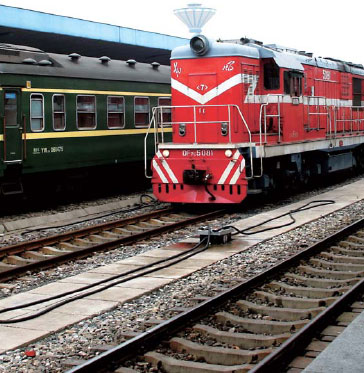Long rail journey: UBS report predicts investment shortfall of 200 billion yuan
The railway sector will see an annual investment shortfall of 200 billion yuan ($28.60 billion) in three years, said UBS Securities in Shanghai, according to China Securities Journal.
Wei Qiang, vice-director of UBS Securities, said the railways need 1.25 trillion yuan in capital over the five years between 2006 and 2010, but capital expenditures will total about 300 billion yuan annually over the next three years, resulting in an investment gap of 200 billion yuan for the period.
Compared with other industries including power, telecommunications and banks, the railway sector is still in its initial phase of development with more reconstruction needs, said the UBS research report.
Wei said the Ministry of Railways will inject more capital in three listed companies - Daqin Railways, Guangshen Railways and Tielong Container Logistics - and attract more commercial capital, including private capital.

"It is impossible to issue bonds or take loans to fill the gap," said Wei, explaining that in 2006, the Ministry of Railways' capital and interest repayments totaled 56 billion yuan, far higher than its profit of 3.2 billion yuan.
Figures show transportation profits totaled about 3 billion yuan in 2006, with total assets of 1.52 trillion yuan and an asset-to-debt ratio of 80 percent.
Wei added that it is impossible for the railway sector to separate infrastructure management from operations.
"In the future the railway will still combine infrastructure with operations, because more dense transportation coverage will result in better returns," he said.
According to USB projections, new companies serving Shenyang, Beijing, Chengdu, Shanghai and Guangzhou, and the railway department will be publicly listed, joining the current 18 railway bureaus, to raise capital for high-speed railways.
Wei said there will be more competition and reduced operating costs once bigger operators are formed.
Transportation fees may be adjusted in the near term to improve profit and attract more capital, said Wei.
UBS profit modeling shows returns on cargo investment will reach 8.6 percent when cargo transportation fees increase by 30 percent, and 9.1 percent for passenger transportation investment returns when passenger tickets are raised by 20 percent.
"But passenger transportation prices are sensitive - they haven't changed for 13 years," said Wei.
Source: Logistics China, a monthly English review published by Chinadaily.com.cn
(China Daily 06/16/2008 page20)














